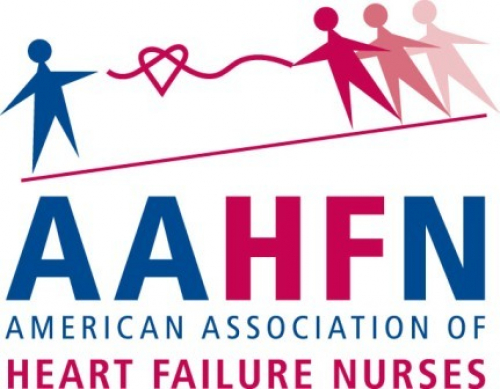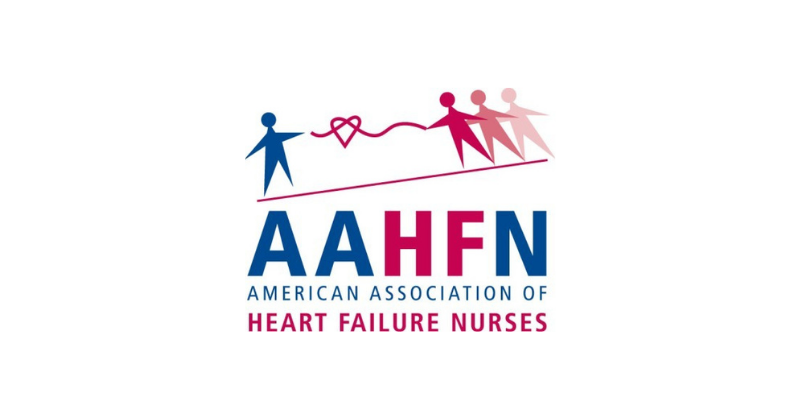Healthy Nurse, Healthy Nation™ - Champion Spotlight Series - American Association Of Heart Failure Nurses (AAHFN)
Published

Nursing organization creates monthly programming to promote nurse well-being
We are pleased to shine the spotlight on the American Association of Heart Failure Nurses (AAHFN), an exceptional Healthy Nurse, Healthy Nation™ (HNHN) Champion.
Nursing has always been a field with high stress and burnout. But the past 2 years of the pandemic have taken those unwanted consequences to the extreme. AAHFN recognized this among its members and acted swiftly to incorporate monthly programming to help — even just a little.
Throughout 2021, AAHFN launched the “It Starts with Me” movement — a monthly education program with different topics geared towards nurse well-being. The goal of the initiative was to provide heart failure prevention education for nurses themselves through healthy living resources.
“There is just so much burnout, and nurses can’t take care of themselves like they need to,” said Karyn Lockshine, CMP, Executive Director of AAHFN. “Their health is in jeopardy, so we did a big push to help people focus on their own health more.”
The “It Starts with Me” program covered topics like:
- Exercise
- Sleep
- Diet and nutrition
- COVID-19
- Small, sustainable changes
Something for Everyone
Each month, AAHFN would rotate the programs and topics of focus. The second Tuesday of every month featured an hour-long webinar members could use for CE. July had 2 webinars, the first on plant-based diets and the second on COVID-19 and ethnic disparities. Both were some of the most well-liked events of the entire year.
“For our webinars in general, we’ve had excellent participation,” said Karyn. “We had at least 200 people for each of our webinars, as well as a really positive response. It’s been pleasantly surprising.”
The organization also held a 3-month, virtual 5K where members could participate at their own pace by walking or running. AAHFN’s social media channels spurred conversation and motivated members to get moving. Conversations included asking for input on things like favorite songs to listen to while exercising. Members submitted their favorite songs, which AAHFN turned into playlists for participants.
“The 5K was really popular in that it brought people together in a healthy way during a time when they couldn’t be together physically,” said Karyn.
Becoming a Healthier Nurse for a Healthier Nation
Throughout the monthly offerings, AAHFN also encouraged members to join the Healthy Nurse, Healthy Nation movement. The organization used its social media channels and newsletter to spread the word about a commitment to nurse health and well-being.
“Throughout all of this, we provided nurses with motivation to make small yet impactful changes they can actually implement,” said Karyn. “For example, walking. Some nurses might not want to walk anymore after a long shift, but we offered a gentle reminder about how walking outside — even for a moment — can provide an opportunity for quiet self-reflection that might make you feel better.”
Moving forward, AAHFN has multiple plans in the works for health and wellness initiatives throughout 2022. Leadership has seen how impactful promoting nurse health is, and with the pandemic still in full force, nurses need it now more than ever.
What does your organization do to promote nurse well-being? Share with us in our discussion below.
The AAHFN is a specialty organization dedicated to advancing nursing education, clinical practice, and research to improve heart failure patient outcomes.

Not a member of Healthy Nurse, Healthy Nation (HNHN) yet? Join us today!
Blog Champion Spotlight
02/01/2022 4:41pm CST




Post a Comment or Question
Accessible Healthcare
Cardiovascular Health for African Americans in Kent County, Maryland
Cardiovascular disease is the leading cause of death around the world (WHO, 2021). The rates of Cardiovascular disease (CVD) are higher in the African American population throughout the United States, and this is reflected in Kent County, Maryland as well. CVD is a group of disease that affect the heart or the veins and arteries. In fact, in 2018, African American deaths in Kent County (KC), due to heart disease, were at a rate of 435.52 per 100,000, while Caucasians were at a much lower rate of 169.1 per 100,000 people (LiveStories, 2018). This shows the disparity in health for cardiovascular disease. The difference cannot be blamed on the physical environment as it compares two populations living in the same county. However, if the inequity is to be addressed, it must first be understood.
Why is a plan necessary
A plan to decrease the incidence of CVD and CVD related deaths in the AA population of KC is necessary because AAs are living with CVD disease in higher numbers and are dying earlier from CVD. To fight CVD, we must begin with the risk factors. Risk factors for CVD include unhealthy diet, smoking, lack of physical activity, high blood pressure, high cholesterol, diabetes, and obesity (WHO, 2021). High blood pressure is excessively high in the AA population, and recent studies have found that it is responsible for 50% of the higher death rate in the AA population compared to Whites in the USA (Musemwa & Gadegbeku, 2017). The rate of hypertension in African Americans is higher than any other race in the world and the decrease in rates of CVD in many populations has not been the same in the AA population (Carnethon et al., 2017). The risk factors are the reason for the earlier onset of CVD and even with medications, the treatment of the disease is less effective among the AA population (Carnethon et al., 2017). A study conducted in 2012 found the AA life expectancy to be 3.4 years less than that of Caucasians, and among the top 25 causes of death, 6 out of 10 substantial contributors to the years of life lost are risk factors for CVD (Carnethon et al., 2017). Too many lives are being lost, too many years are being lived at less than optimal health.
Why Should I Care?
African Americans should be aware that while CVD is one of the highest health risks, and reasons for early death, it can often be better managed and even prevented (Carnethon et al., 2017). Of the risk factors for CVD, high blood pressure is the worst – and 42.4% of male AAs and 44% of female AAs 20 years and older have high blood pressure in the United States (Carnethon et al., 2017). Diabetes, high cholesterol, and obesity also are higher in the AA population. The good news is that these numbers can change by following a plan for healthier living. Improving diet, getting more physical activity, quitting smoking, and following a medication plan when needed can all lower the rates of high blood pressure and CVD.
Plans for Reducing the Disparity
Below are plans for reducing CVD through decreasing the risk factors that can be changed in the African American population, along with links to resources where help can be found.
Diet
Following a heart healthy diet will not only help in lowering cholesterol and losing weight, but will also be a healthy dietary choice overall. The diet includes drinking plenty of water, eating 2,000 calories or less per day – with fresh foods including fruits and vegetables, whole grains, lean proteins, low salt and sugar, and increasing activity (The American Heart Association Diet and Lifestyle Recommendations, 2022).
You can access a link to how to follow this diet as well as other meal planning tips at:
Healthy Eating
Smoking Cessation
Quitting smoking is a huge challenge, and we want you to succeed! The success of people in quitting is much higher when a person does not try it alone. The first link here is for a program offered through the health department, and it includes a personalized plan to quit and a support group online (Kent County Department of Health [KCHD], n.d.).
Help Me Quit Smoking
The second link is for a Maryland site to help you live tobacco-free.
Maryland Quits
Exercise
One of the reasons that people give for not exercising is that they don’t have the money to join a gym. The American Heart Association recommends 150 minutes (or 30 minutes, 5 times) per week. The good news is that this exercise can be walking or playing a lawn game or swimming or any activity that gets the heart beating faster. There is also a brand new YMCA in Chestertown that bases the cost of the program on a patron’s income. They offer swimming, weights, yoga, aerobics, spinning, and a host of other classes. They can be reached at: Kent County YMCA
I urge you to use these links and get your blood pressure, weight, and cholesterol under control so that you can continue living your very best life!
References
Carnethon, M. R., Pu, J., Howard, G., Albert, M. A., Anderson, C. A., Bertoni, A. G., Mujahid, M. S., Palaniappan, L., Taylor, H. A., Willis, M., & Yancy, C. W. (2017). Cardiovascular health in african americans: A scientific statement from the american heart association. Circulation, 136(21). https://doi.org/10.1161/cir.0000000000000534
Kent County Department of Health. (n.d.). Kent. Smoking Stops Here: 1-800 QUIT NOW. Retrieved May 12, 2022, from https://smokingstopshere.com/locations/kent/
LiveStories. (2018). Kent county heart disease statistics. Retrieved May 11, 2022, from https://www.livestories.com/statistics/maryland/kent-county-heart-disease-deaths-mortality
Musemwa, N., & Gadegbeku, C. A. (2017). Hypertension in african americans. Current Cardiology Reports, 19(12). https://doi.org/10.1007/s11886-017-0933-z
The american heart association diet and lifestyle recommendations. (2022). www.heart.org. Retrieved May 12, 2022, from https://www.heart.org/en/healthy-living/healthy-eating/eat-smart/nutrition-basics/aha-diet-and-lifestyle-recommendations
World Health Organization. (2021, June 11). Cardiovascular diseases (cvds). Cardiovascular diseases (CVDs). https://www.who.int/news-room/fact-sheets/detail/cardiovascular-diseases-(cvds)